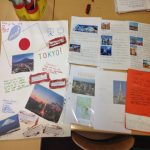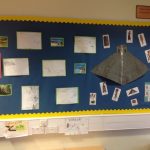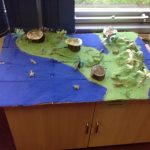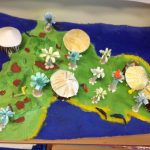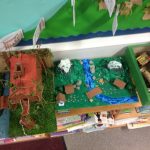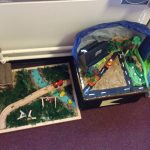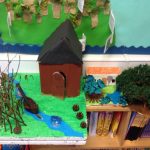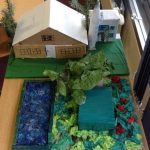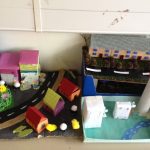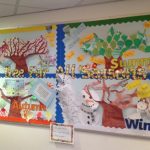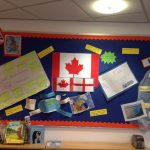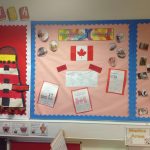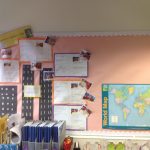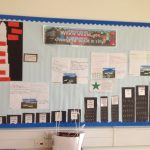KS2 Curriculum
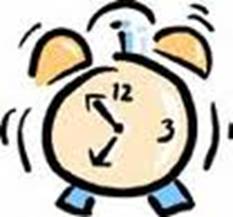 Subjects- time coverage
Subjects- time coverage
At KS2, pupils receive a minimum of:
• 5 hours Literacy
• 5 hours Numeracy
• 2 hours science
• 2 hours PE
• 1 hour ICT
• 2 hours of Creative Curriculum
• 1 hour RE2
• 2 ½ hours Reading/ Key skills
• 1 hour PHSCE
• ½ hr Music
Other time is allowed for specific skills to be taught e.g. extra art weeks/ DT focus/ phonics etc
Main Coverage with Subjects
Literacy:
![]() Pupils are taught through a varied curriculum that is tailored to suit individual class needs. However, all classes have opportunity to learn the skills needed in reading, writing, speaking and listening. They will also cover a wide range of fiction, non-fiction and poetry genres e.g. persuasive writing, diaries, newspapers, myths/ legends, stories from familiar/ fantasy settings, historical fiction, letters, non-chronological reports. The application of writing is widely encouraged through cross- curricular links.
Pupils are taught through a varied curriculum that is tailored to suit individual class needs. However, all classes have opportunity to learn the skills needed in reading, writing, speaking and listening. They will also cover a wide range of fiction, non-fiction and poetry genres e.g. persuasive writing, diaries, newspapers, myths/ legends, stories from familiar/ fantasy settings, historical fiction, letters, non-chronological reports. The application of writing is widely encouraged through cross- curricular links.
Numeracy:
![]() The pupils are given opportunity to learn from the full range of maths objectives including number, shape and space, handing data, measures and investigation/ real life maths. They will also learn to calculate mentally, use efficient written methods and use a calculator as appropriate. Pupils experience a range of teaching approaches including regular mental maths and Triple P (patterns, puzzles and problems) lessons where the focus is on using and applying their maths knowledge and understanding in real life situations.
The pupils are given opportunity to learn from the full range of maths objectives including number, shape and space, handing data, measures and investigation/ real life maths. They will also learn to calculate mentally, use efficient written methods and use a calculator as appropriate. Pupils experience a range of teaching approaches including regular mental maths and Triple P (patterns, puzzles and problems) lessons where the focus is on using and applying their maths knowledge and understanding in real life situations.
Science:
![]() The science curriculum runs on a cyclical programme in KS2 where topics that are taught in one year and revisited and extended in subsequent years. This ensures that knowledge is built upon and key skills are vocabulary are embedded. The pupils cover the breadth of objectives in life processes, physical processes, materials and investigation/ scientific enquiry. We adopt a practical approach to Science with pupils learning through devising and conducting scientific experiments and inquiry to find the answers to their own scientific questions.
The science curriculum runs on a cyclical programme in KS2 where topics that are taught in one year and revisited and extended in subsequent years. This ensures that knowledge is built upon and key skills are vocabulary are embedded. The pupils cover the breadth of objectives in life processes, physical processes, materials and investigation/ scientific enquiry. We adopt a practical approach to Science with pupils learning through devising and conducting scientific experiments and inquiry to find the answers to their own scientific questions.
ICT:
 Pupils have regular timetabled slots within our ICT suit and also have opportunities to access the suite of laptops within their own classrooms. ICT skills are taught discretely and cover all the areas of ICT including digital imagery, control, music, internet safety, text and multi-media etc. Where possible, ICT skills are applied through the ICT across the curriculum.
Pupils have regular timetabled slots within our ICT suit and also have opportunities to access the suite of laptops within their own classrooms. ICT skills are taught discretely and cover all the areas of ICT including digital imagery, control, music, internet safety, text and multi-media etc. Where possible, ICT skills are applied through the ICT across the curriculum.
PE:
PE sessions are split over the week and may include swimming, games, dance, gym, athletics etc.
Geography:
We have focused on many geography topics through our Topic lessons this year and there has been a school focus on different settlements in Upper and Lower KS2.
The children in lower KS2 really enjoyed their creative half term homework, which involved them making a 3D settlement. They showed brilliant creativity and worked hard to show what their settlement would look like.
There has been work focusing on the location of different countries and further uses of maps have been developed in KS1.
This year, as a school, we have been focusing on using maths with cross-curricular links our Topic lessons. We have been developing our children’s skills as mathematicians to show extra work using maths in all subject areas.
We have been particularly focusing on completing timelines to show our numerical ordering, use of graphs to show our results and using heights and lengths to compare.
Creative Curriculum:
These lessons cover the skills needed for Art/ DT/ Hist/ Geog. A topic approach is taken with the main subject focus being different in each topic. We run a two-year rolling programme to ensure skills are not repeated. Topics in KS2 last for one term. Lessons are planned with the pupils input so that they have ownership of what they learn.
|
Year A |
Autumn 1 |
Autumn 2 |
Spring 1 |
Spring 2 |
Summer 1 |
Summer 2 |
|
Y3/4/5 |
Who was Henry VIII? (HIST/ART) |
Who invaded Britain? (HIST/ ART) |
Who lives in the jungle? (GEOG/ ART) |
|||
|
Y5/6 |
Why is Planet Earth so cool? (GEOG/ SCI) |
What is ‘Super’ about Stoke? (HIST/ ART) |
What do you know about water? (GEOG) |
|||
|
Year B |
Autumn 1 |
Autumn 2 |
Spring 1 |
Spring 2 |
Summer 1 |
Summer 2 |
|
Y3/4/5 |
What was Britain like during WW2? (HIST) |
Why are the British Isles special? (GEOG) |
Who were the Greeks and Egyptians anyway? (HIST) |
|||
|
Y5/6 |
Why was it a hard knock life? (HIST/ ART) |
Where is Kensuke’s Kingdom? (LIT/ GEOG/ ART) |
Which was the best decade? (HIST, ART) |
|||
Within each topic, pupils will experience a range of teaching approaches and activities.
RE:
 Pupils will have opportunities to learn about Christianity, Judaism and Islam. They will learn about religion and from religion in a range of contexts.
Pupils will have opportunities to learn about Christianity, Judaism and Islam. They will learn about religion and from religion in a range of contexts.
Music:
Pupils will learn about the theory and practise of music and musical instruments. The lessons are very practical and pupils have every opportunity to participate in singing, playing instruments, composing, performing, evaluating.
PHSCE:
These lessons allow pupils to learn themselves, others and the community we live in. The lessons teach the children to consider their own actions and those of others, trying to understand other people and be tolerant of their differences.
French
 Each week our Key Stage 2 classes have a French lesson where they learn to write, read, speak and understand key vocabulary and sentences, we learn through games, flashcards, the internet and songs. Each year group learns a unit per term in order to progress in language skills and prepare children for learning a language at high school.
Each week our Key Stage 2 classes have a French lesson where they learn to write, read, speak and understand key vocabulary and sentences, we learn through games, flashcards, the internet and songs. Each year group learns a unit per term in order to progress in language skills and prepare children for learning a language at high school.
French update
From pupil interviews lots of things are going well in French and children really enjoy French lessons.
Children enjoy playing the games that staff have made (thank you) and children particularly commented that they enjoyed the class games (like time bomb) where they go round in a circle recapping vocabulary. Children also found it useful when vocabulary was on display.
All staff are regularly teaching French and seem to be getting more confident as we go along. And from feedback, the children apparently would like more singing!
| Year Group | Autumn | Spring | Summer |
|
Year 3 |
Unit 1: |
Unit 2: |
Unit 3: |
|
Year 4 |
Unit 4: |
Unit 5: |
Unit 6: |
|
Year 5/6 G |
Unit 7: |
Unit 8: |
Unit 9: |
Espresso has a range of activities to support learning of French and the websites below all help in children learning the vocabulary and increasing their confidence in French – they also have a lot of fun!!!
The PRIMARY FRENCH website has both animated and non-animated content.
BBC Schools is a service for children, parents and teachers at home and at school – fun and easy to use curriculum based learning resources.
http://www.bbc.co.uk/schools/primaryfrench/index_flash.shtml
Games and activities with basic French vocabulary for families to play together.
http://www.bbc.co.uk/languages/french/family/
Contains interactive games and activities suitable for KS2
http://www.languagesonline.org.uk/
Website that gives general basic words in many languages
http://www.newburypark.redbridge.sch.uk/langofmonth/

